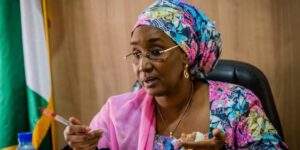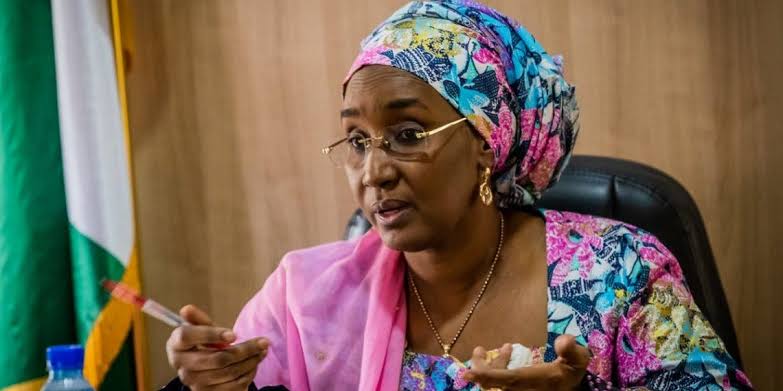SERAP gives FG seven days to disclose details of payments of N729bn to 24.3 million poor Nigerians

Socio-Economic Rights and Accountability Project (SERAP) has urged Ms Sadia Umar-Farouk, Minister of Humanitarian Affairs, Disasters Management and Social Development to “publish details of proposed payments of N729bn to 24.3 million poor Nigerians for six months, including the mechanisms and logistics for the payments, list of beneficiaries, and how they have been selected, projected payments per state, and whether the payments will be made in cash or through Bank Verification Numbers or other means.”
SERAP also urged her to “explain the rationale for paying N5,000 to 24.3 million poor Nigerians, which translates to five-percent of the country’s budget of N13.6 trillion for 2021, and to clarify if this proposed spending is part of the N5.6 trillion budget deficit.”
Ms Sadia Umar-Farouk had last week disclosed that the Federal Government would pay about 24.3 million poor Nigerians N5,000 each for a period of six months to “provide help to those impoverished by the COVID-19 pandemic.”
In the Freedom of Information request dated 23 January 2021 and signed by SERAP deputy director Kolawole Oluwadare, the organization said: “Publishing the details of beneficiaries and selection criteria, as well as the payment plan for six months would promote transparency and accountability, and remove the risks of mismanagement and diversion of public funds.”
SERAP said: “Transparency and accountability in the programme would improve public trust, and allow Nigerians to track and monitor its implementation, and to assess if the programme is justified, as well as to hold authorities to account in cases of diversion, mismanagement and corruption.”
SERAP also urged Ms Umar-Farouk to: “invite the Economic and Financial Crimes Commission (EFCC) and Independent Corrupt Practices and Other Related Offences Commission (ICPC) to jointly track and monitor the payments.”
The FoI request, read in part: “We would be grateful if the requested information is provided to us within seven days of the receipt and/or publication of this letter. If we have not heard from you by then, SERAP shall take all appropriate legal actions under the Freedom of Information Act to compel you to comply with our request.”
Providing support and assistance to socially and economically vulnerable Nigerians is a human rights obligation but the programme to spend five-percent of the 2021 budget, which is mostly based on deficit and borrowing, requires anti-corruption safeguards to ensure the payments go directly to the intended beneficiaries, and that public funds are not mismanaged or diverted.”
“SERAP notes that the Nigerian Constitution of 1999 [as amended], UN Convention against Corruption, and African Union Convention on Preventing and Combating Corruption to which Nigeria is a state party require the government to set the highest standards of transparency, accountability and probity in programmes that it oversees.”
“The government has a responsibility to ensure that these requirements and other anti-corruption controls are fully implemented and monitored, and that the payments are justified in light of the huge budget deficit and borrowing, and whether there are better ways to spend N729bn to support poor Nigerians.”
“Several questions remain as to the implementation and monitoring mechanisms for the payments, and whether this is the best and most effective way to spend N729bn to support socially and economically vulnerable Nigerians.”
Our requests are brought in the public interest, and in keeping with the requirements of the Nigerian Constitution 1999 [as amended], the Freedom of Information Act, and UN Convention against Corruption, African Union Convention on Preventing and Combating Corruption, and African Charter on Human and Peoples’ Rights to which Nigeria is a state party.”
“By Section 1 (1) of the Freedom of Information (FoI) Act 2011, and Article 9 of the African Charter on Human and Peoples’ Rights, SERAP is entitled as of right to request for or gain access to information, including information on details of beneficiaries of the direct payments of N729bn.”
“By Section 4 (a) of the FoI Act, when a person makes a request for information from a public official, institution or agency, the public official, institution or urgency to whom the application is directed is under a binding legal obligation to provide the applicant with the information requested for, except as otherwise provided by the Act, within seven days after the application is received.”
By Sections 2(3)(d)(V) & (4) of the FoI Act, there is a binding legal duty to ensure that documents containing information including information on details of payments of N729bn to N24.3 million poor and vulnerable Nigerians are widely disseminated and made readily available to members of the public through various means.”
“The information being requested does not come within the purview of the types of information exempted from disclosure by the provisions of the FoI Act. The information requested for as indicated above, apart from not being exempted from disclosure under the FoI Act, bothers on an issue of national interest, public concern, interest of human rights, social justice, good governance, transparency and accountability.”
















Add comment